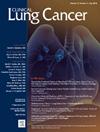洛拉替尼与阿来替尼、洛拉替尼与布瑞替尼治疗ALK阳性晚期/转移性NSCLC的疗效和安全性比较:匹配调整后的间接比较。
IF 3.3
3区 医学
Q2 ONCOLOGY
引用次数: 0
摘要
简介第三代无性淋巴瘤激酶(ALK)酪氨酸激酶抑制剂(TKI)lorlatinib与第二代ALK TKIs作为ALK+晚期/转移性非小细胞肺癌(NSCLC)一线治疗药物的疗效和安全性比较仍不确定,因为没有头对头临床试验:利用证明疗效优于克唑替尼(第一代ALK TKI)的III期试验数据进行匹配调整间接比较(MAIC)。在基于预设效应修饰因子进行匹配的情况下,对罗拉替尼(CROWN)与阿埃替尼(ALEX和ALESIA)和布瑞加替尼(ALTA-1L)进行了MAIC比较。疗效结果包括无进展生存期(PFS)、客观反应(OR)和中枢神经系统进展时间(TTP-CNS)。安全性结果包括≥3级不良事件(AE)和导致治疗中止、剂量减少或剂量中断的不良事件:与阿来替尼(ALEX)(HR:0.54 [95% CI:0.33, 0.88])和布瑞加替尼(ALTA-1L)(HR:0.51 [95% CI:0.31, 0.82])相比,估计洛拉替尼可改善PFS。据估计,与布加替尼相比,洛拉替尼可改善TTP-CNS(HR:0.19 [95% CI:0.05, 0.71])。与阿来替尼相比,估计lorlatinib的≥3级AE发生率更高(RR:1.48 [95% CI:1.13, 1.94]);然而,在其他安全性终点(即导致停药、减量或中断的AE)方面,与brigatinib相比没有观察到差异:据估计,洛拉替尼的疗效优于第一代和第二代ALK-TKIs,但与阿来替尼相比,≥3级AEs的发生率较高。这些数据支持将劳拉替尼作为ALK+晚期/转移性NSCLC的一线治疗药物。本文章由计算机程序翻译,如有差异,请以英文原文为准。
Comparative Efficacy and Safety of Lorlatinib Versus Alectinib and Lorlatinib Versus Brigatinib for ALK-Positive Advanced/Metastatic NSCLC: Matching-Adjusted Indirect Comparisons
Introduction
The comparative efficacy and safety of lorlatinib, a third-generation anaplastic lymphoma kinase (ALK) tyrosine kinase inhibitor (TKI), versus second-generation ALK TKIs as a first-line treatment for ALK+ advanced/metastatic nonsmall cell lung cancer (NSCLC) remains uncertain as there are no head-to-head clinical trials.
Methods
Matching-adjusted indirect comparisons (MAICs) were conducted using phase III trial data demonstrating superior efficacy over crizotinib, a first-generation ALK TKI. MAICs were conducted to compare lorlatinib (CROWN) versus alectinib (ALEX and ALESIA) and brigatinib (ALTA-1L) with matching based on prespecified effect modifiers. Efficacy outcomes included progression-free survival (PFS), objective response (OR), and time to progression in the central nervous system (TTP-CNS). Safety outcomes included Grade ≥3 adverse events (AEs) and AEs leading to treatment discontinuation, dose reduction, or dose interruption.
Results
Lorlatinib was estimated to improve PFS compared to alectinib (ALEX) (HR: 0.54 [95% CI: 0.33, 0.88]) and brigatinib (ALTA-1L) (HR: 0.51 [95% CI: 0.31, 0.82]). Lorlatinib was estimated to improve TTP-CNS compared with brigatinib (HR: 0.19 [95% CI: 0.05, 0.71]). The estimated Grade ≥3 AE rate was higher with lorlatinib than with alectinib (RR: 1.48 [95% CI: 1.13, 1.94]); however, no differences were observed in other safety endpoints (ie, AEs leading to discontinuation, dose reduction, or interruption) or compared to brigatinib.
Conclusion
Lorlatinib was estimated to have superior efficacy over first- and second-generation ALK-TKIs, but a higher rate of Grade ≥3 AEs compared to alectinib. These data support the use of lorlatinib as a first-line treatment for ALK+ advanced/metastatic NSCLC.
求助全文
通过发布文献求助,成功后即可免费获取论文全文。
去求助
来源期刊

Clinical lung cancer
医学-肿瘤学
CiteScore
7.00
自引率
2.80%
发文量
159
审稿时长
24 days
期刊介绍:
Clinical Lung Cancer is a peer-reviewed bimonthly journal that publishes original articles describing various aspects of clinical and translational research of lung cancer. Clinical Lung Cancer is devoted to articles on detection, diagnosis, prevention, and treatment of lung cancer. The main emphasis is on recent scientific developments in all areas related to lung cancer. Specific areas of interest include clinical research and mechanistic approaches; drug sensitivity and resistance; gene and antisense therapy; pathology, markers, and prognostic indicators; chemoprevention strategies; multimodality therapy; and integration of various approaches.
 求助内容:
求助内容: 应助结果提醒方式:
应助结果提醒方式:


